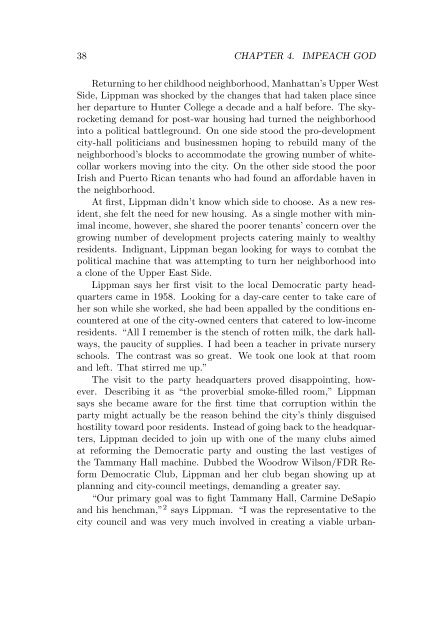Create successful ePaper yourself
Turn your PDF publications into a flip-book with our unique Google optimized e-Paper software.
38 CHAPTER 4. IMPEACH GOD<br />
Returning to her childhood neighborhood, Manhattan’s Upper West<br />
Side, Lippman was shocked by the changes that had taken place since<br />
her departure to Hunter College a decade and a half before. The skyrocketing<br />
demand for post-war housing had turned the neighborhood<br />
into a political battleground. On one side stood the pro-development<br />
city-hall politicians and businessmen hoping to rebuild many of the<br />
neighborhood’s blocks to accommodate the growing number of whitecollar<br />
workers moving into the city. On the other side stood the poor<br />
Irish and Puerto Rican tenants who had found an affordable haven in<br />
the neighborhood.<br />
At first, Lippman didn’t know which side to choose. As a new resident,<br />
she felt the need for new housing. As a single mother with minimal<br />
income, however, she shared the poorer tenants’ concern over the<br />
growing number of development projects catering mainly to wealthy<br />
residents. Indignant, Lippman began looking for ways to combat the<br />
political machine that was attempting to turn her neighborhood into<br />
a clone of the Upper East Side.<br />
Lippman says her first visit to the local Democratic party headquarters<br />
came in 1958. Looking for a day-care center to take care of<br />
her son while she worked, she had been appalled by the conditions encountered<br />
at one of the city-owned centers that catered to low-income<br />
residents. “All I remember is the stench of rotten milk, the dark hallways,<br />
the paucity of supplies. I had been a teacher in private nursery<br />
schools. The contrast was so great. We took one look at that room<br />
and left. That stirred me up.”<br />
The visit to the party headquarters proved disappointing, however.<br />
Describing it as “the proverbial smoke-filled room,” Lippman<br />
says she became aware for the first time that corruption within the<br />
party might actually be the reason behind the city’s thinly disguised<br />
hostility toward poor residents. Instead of going back to the headquarters,<br />
Lippman decided to join up with one of the many clubs aimed<br />
at reforming the Democratic party and ousting the last vestiges of<br />
the Tammany Hall machine. Dubbed the Woodrow Wilson/FDR Reform<br />
Democratic Club, Lippman and her club began showing up at<br />
planning and city-council meetings, demanding a greater say.<br />
“Our primary goal was to fight Tammany Hall, Carmine DeSapio<br />
and his henchman,” 2 says Lippman. “I was the representative to the<br />
city council and was very much involved in creating a viable urban-


